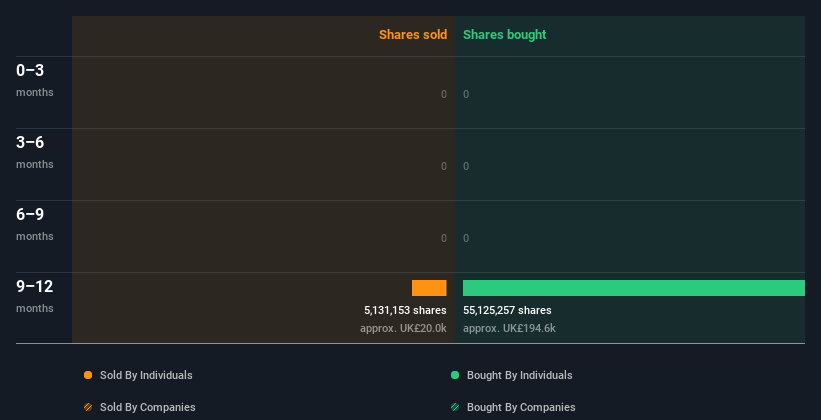Positive Signs As Multiple Insiders Buy Ironveld Stock
When a single insider purchases stock, it is typically not a major deal. However, when multiple insiders purchase stock, like in Ironveld Plc's (LON:IRON) instance, it's good news for shareholders.
While we would never suggest that investors should base their decisions solely on what the directors of a company have been doing, we do think it is perfectly logical to keep tabs on what insiders are doing.
Check out our latest analysis for Ironveld
Ironveld Insider Transactions Over The Last Year
In the last twelve months, the biggest single purchase by an insider was when Executive Chairman John Wardle bought UK£157k worth of shares at a price of UK£0.0031 per share. That means that even when the share price was higher than UK£0.0014 (the recent price), an insider wanted to purchase shares. While their view may have changed since the purchase was made, this does at least suggest they have had confidence in the company's future. In our view, the price an insider pays for shares is very important. Generally speaking, it catches our eye when insiders have purchased shares at above current prices, as it suggests they believed the shares were worth buying, even at a higher price.
Happily, we note that in the last year insiders paid UK£177k for 55.13m shares. On the other hand they divested 5.13m shares, for UK£20k. Overall, Ironveld insiders were net buyers during the last year. You can see a visual depiction of insider transactions (by companies and individuals) over the last 12 months, below. If you click on the chart, you can see all the individual transactions, including the share price, individual, and the date!
Ironveld is not the only stock that insiders are buying. For those who like to find winning investments this free list of growing companies with recent insider purchasing, could be just the ticket.
Insider Ownership
Another way to test the alignment between the leaders of a company and other shareholders is to look at how many shares they own. Usually, the higher the insider ownership, the more likely it is that insiders will be incentivised to build the company for the long term. It appears that Ironveld insiders own 27% of the company, worth about UK£1.6m. While this is a strong but not outstanding level of insider ownership, it's enough to indicate some alignment between management and smaller shareholders.
What Might The Insider Transactions At Ironveld Tell Us?
It doesn't really mean much that no insider has traded Ironveld shares in the last quarter. But insiders have shown more of an appetite for the stock, over the last year. Overall we don't see anything to make us think Ironveld insiders are doubting the company, and they do own shares. So these insider transactions can help us build a thesis about the stock, but it's also worthwhile knowing the risks facing this company. To help with this, we've discovered 5 warning signs (4 are a bit unpleasant!) that you ought to be aware of before buying any shares in Ironveld.
But note: Ironveld may not be the best stock to buy. So take a peek at this free list of interesting companies with high ROE and low debt.
For the purposes of this article, insiders are those individuals who report their transactions to the relevant regulatory body. We currently account for open market transactions and private dispositions of direct interests only, but not derivative transactions or indirect interests.
Have feedback on this article? Concerned about the content? Get in touch with us directly. Alternatively, email editorial-team (at) simplywallst.com.
This article by Simply Wall St is general in nature. We provide commentary based on historical data and analyst forecasts only using an unbiased methodology and our articles are not intended to be financial advice. It does not constitute a recommendation to buy or sell any stock, and does not take account of your objectives, or your financial situation. We aim to bring you long-term focused analysis driven by fundamental data. Note that our analysis may not factor in the latest price-sensitive company announcements or qualitative material. Simply Wall St has no position in any stocks mentioned.

 Yahoo Finance
Yahoo Finance 
